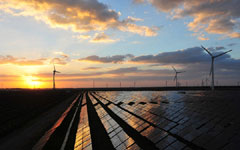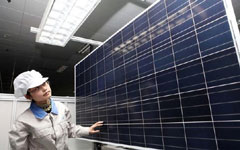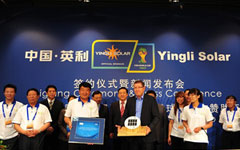Clouds lift for solar firms after tough time
By Xie Yu in Shanghai (China Daily) Updated: 2014-05-22 06:53Consolidation is deepening in China's solar-energy industry. Competition on the domestic market continues. Companies face global trade barriers.
"It is a recovery year," Stuart Brannigan, vice president of sales and marketing Europe and America ZNSHINE Solar said. "We have toughed out the supply glut and shrinking demand after several countries cut tariffs and subsidies."
The ZNSHINE Group was established in Jintan, in China's eastern Jiangsu province, in 1988.
 |
 |
 |
"It is quite similar to what happened to the semiconductor industry," he said. "It does not mean that all small companies cannot survive. They have to be more flexible and better tap the niche market just like boutique hotels."
China's government pushes on with domestic solar station installations to combat pollution. Weak players fail. Statistics suggest Chinese solar companies are likely to revive. Twenty-four of the 32 listed solar companies were profitable last year. Eight of them doubled their net profit.
"Industry insiders are becoming more rational on the China market," Zhang Weiming, vice-president of technology with Heraeus Inc, said. "Many have learned lessons over the past several years when suffering from oversupply. Meanwhile, more emphasis is going to quality control as solar plant installation expands."
Heraeus, a precious metal and technology firm headquartered in Hanau near Frankfurt, Germany, will open a new front-side paste production site in China, their biggest market.
Although the Chinese government raised its installation target and encouraged connection from solar stations to the state grid, pressure and risks on the global market remain.
Chinese solar companies and industry associations released a statement on Wednesday from Shanghai objecting to the second round of US "anti-dumping and anti-subsidy" investigations.
The investigation was initiated to close a loophole in the first round of anti-dumping tariffs imposed last year. That allowed Chinese companies to avoid US tariffs by using solar cells made on the Chinese mainland. A ruling in the case is expected in early June.
"We estimate that $20 billion to $30 billion worth of exports would be affected if the US government decided to impose punitive duties," said Shawn Qu, CEO of Nasdaq-listed Canadian Solar Inc.
Many Chinese solar companies returned to profit recently. The possible trade barrier created in the US will definitely hit the industry. However, as the solar-power industry globalizes, the market will no longer be dominated by US and European companies, Qu said.
- China 'incredibly innovative' in many areas: Apple CEO
- City official: Guangzhou further committed to opening-up
- Jack Ma: Globalization backed by technology will cut inequality
- HNA confirms interest in ASEAN's infrastructure investment
- Comments on Xi's letter to 2017 Fortune Global Forum
- China to create more opportunities for the world: Xi
- US tax cuts impact on China two-sided: economists
- Chinese enterprises job fair to be held in Sri Lanka

















